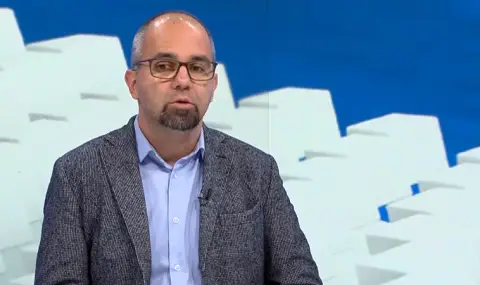Part of the parties intuitively or instinctively may want new elections because of the possibility that if Peevski continues to grow, the sanitary cordon around him will be created naturally. This thesis was developed in an interview for BNR by the political scientist Parvan Simeonov.
"If Mr. Peevski continues as he can, he is on his way to making Borisov's mistake in 2020 – how long there were up to two, three, four oppositions. Borisov made a mistake when he stayed, because all his oppositions united out of nowhere. If Mr. Peevski continues to grow, he is on his way to uniting all his otherwise insufferable opponents into one camp. We have this lack of wind in politics today. Tomorrow we won't have it because we will have a clear mandate: Peevski or everything else. If it grows through new elections, the bubble may naturally burst. Unless we are really dealing with a political phenomenon. Mr. Peevski has so far refuted all predictions of his quick end."
In the show "Above all" the political scientist also launched his hypothesis about two different majorities and which could be liked more. The first - a new assembly between GERB, PP-DB and ITN and BSP in supporting roles, or else, the alternative majority, "by which everyone is scandalized":
"Who can be in it: "Revival", who keep a position and are on the wave of a significant part of the Bulgarians; SWORD, which are rising radicals and most likely will continue to grow; the anti-Borisov parties and somewhere in there the figure of Asen Vassilev, who every Bulgarian pensioner will tell you is historical. Which majority will be more liked? Whether the next assembly, which represents a heavy compromise on all vectors, or this majority, which contains the current radicals, plus the one who raised pensions. The alternative majority, for better or for worse, will be more liked."
There is an intersection of the two main political currents in Bulgaria. One: corruption – anti-corruption, judicial reform, the images of Borisov, Peevski, Geshev, among others: East – West related to war. These two currents created the last two governments, noted Simeonov. In his words, the formation of the last two regular cabinets was favored by "tailwinds of public opinion and international factors", but now these winds are equally strong and cross.
The fight is strong and symbolic – which is worse: corruption or the Kremlin, and in this stupor they don't know where to turn, said the political scientist regarding the political impasse in the parliament and emphasized the loss of another authority – that of the Constitutional Court:
"We started to think of the CS as something conjunctural, with political players inside. This is one of the accompanying victims of the political crisis and the loss of authority."
There is a thesis that Borisov is buying time. I don't understand what he is buying time for - Radev on the field, PP-DB to join forces, if they are short-sighted? Things may become more difficult for Borisov in the next parliament, Simeonov expressed his opinion.
The most important factor is who will make the choices – this office or another, the political scientist stressed.
PP seem "more uncompromising with Borisov, Peevski and everything else", while DB are more flexible. The youngest in terms of political age are also the most playful, therefore everything can be expected of them, including an attempt for a majority with "Vazrazhdane", reports Parvan Simeonov. According to him, we are talking about "a generation more volatile, more fragile in its plans", which is not necessarily a defect because "the more networked, the more unbreakable it is".
PP-DB are on the way to break even "from this overtaking" who is more to blame for the next elections and to steal the possible positives from Borisov's hesitation, he also said.
There are probably a few pinches of "fresh start" both in the BSP and in other formations and this can explain the behavior. The BSP is currently a strange conglomerate that will have to look for itself, Simeonov pointed out and admitted:
"With this constant vibration in one place of the party system will begin to happen in all parties."
